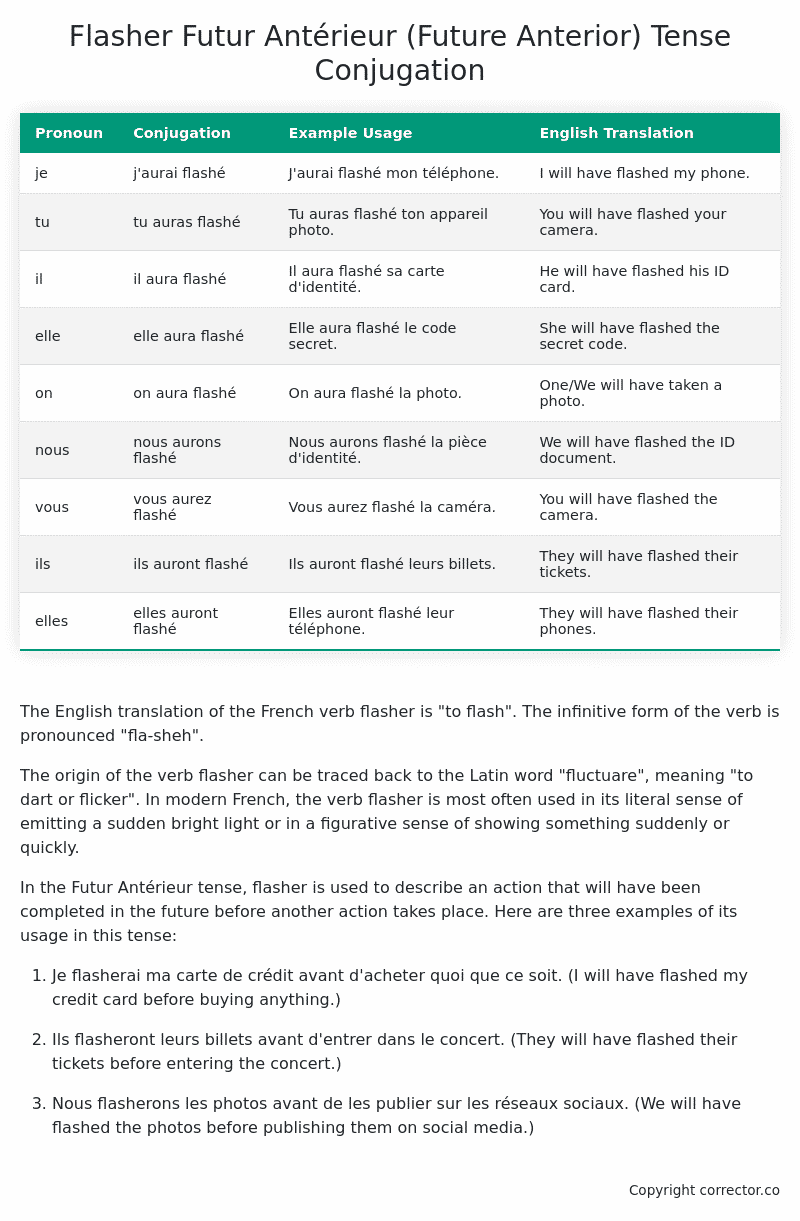Futur Antérieur (Future Anterior) Tense Conjugation of the French Verb flasher
Introduction to the verb flasher
The English translation of the French verb flasher is “to flash”. The infinitive form of the verb is pronounced “fla-sheh”.
The origin of the verb flasher can be traced back to the Latin word “fluctuare”, meaning “to dart or flicker”. In modern French, the verb flasher is most often used in its literal sense of emitting a sudden bright light or in a figurative sense of showing something suddenly or quickly.
In the Futur Antérieur tense, flasher is used to describe an action that will have been completed in the future before another action takes place. Here are three examples of its usage in this tense:
-
Je flasherai ma carte de crédit avant d’acheter quoi que ce soit. (I will have flashed my credit card before buying anything.)
-
Ils flasheront leurs billets avant d’entrer dans le concert. (They will have flashed their tickets before entering the concert.)
-
Nous flasherons les photos avant de les publier sur les réseaux sociaux. (We will have flashed the photos before publishing them on social media.)
Table of the Futur Antérieur (Future Anterior) Tense Conjugation of flasher
| Pronoun | Conjugation | Example Usage | English Translation |
|---|---|---|---|
| je | j’aurai flashé | J’aurai flashé mon téléphone. | I will have flashed my phone. |
| tu | tu auras flashé | Tu auras flashé ton appareil photo. | You will have flashed your camera. |
| il | il aura flashé | Il aura flashé sa carte d’identité. | He will have flashed his ID card. |
| elle | elle aura flashé | Elle aura flashé le code secret. | She will have flashed the secret code. |
| on | on aura flashé | On aura flashé la photo. | One/We will have taken a photo. |
| nous | nous aurons flashé | Nous aurons flashé la pièce d’identité. | We will have flashed the ID document. |
| vous | vous aurez flashé | Vous aurez flashé la caméra. | You will have flashed the camera. |
| ils | ils auront flashé | Ils auront flashé leurs billets. | They will have flashed their tickets. |
| elles | elles auront flashé | Elles auront flashé leur téléphone. | They will have flashed their phones. |
Other Conjugations for Flasher.
Le Present (Present Tense) Conjugation of the French Verb flasher
Imparfait (Imperfect) Tense Conjugation of the French Verb flasher
Passé Simple (Simple Past) Tense Conjugation of the French Verb flasher
Passé Composé (Present Perfect) Tense Conjugation of the French Verb flasher
Futur Simple (Simple Future) Tense Conjugation of the French Verb flasher
Futur Proche (Near Future) Tense Conjugation of the French Verb flasher
Plus-que-parfait (Pluperfect) Tense Conjugation of the French Verb flasher
Passé Antérieur (Past Anterior) Tense Conjugation of the French Verb flasher
Futur Antérieur (Future Anterior) Tense Conjugation of the French Verb flasher (this article)
Subjonctif Présent (Subjunctive Present) Tense Conjugation of the French Verb flasher
Subjonctif Passé (Subjunctive Past) Tense Conjugation of the French Verb flasher
Subjonctif Imparfait (Subjunctive Imperfect) Tense Conjugation of the French Verb flasher
Subjonctif Plus-que-parfait (Subjunctive Pluperfect) Tense Conjugation of the French Verb flasher
Conditionnel Présent (Conditional Present) Tense Conjugation of the French Verb flasher
Conditionnel Passé (Conditional Past) Tense Conjugation of the French Verb flasher
L’impératif Présent (Imperative Present) Tense Conjugation of the French Verb flasher
L’infinitif Présent (Infinitive Present) Tense Conjugation of the French Verb flasher
Struggling with French verbs or the language in general? Why not use our free French Grammar Checker – no registration required!
Get a FREE Download Study Sheet of this Conjugation 🔥
Simply right click the image below, click “save image” and get your free reference for the flasher Futur Antérieur tense conjugation!

Flasher – About the French Futur Antérieur (Future Anterior) Tense
Construction
Common Everyday Usage Patterns
Interactions with Other Tenses
For example
Summary
I hope you enjoyed this article on the verb flasher. Still in a learning mood? Check out another TOTALLY random French verb conjugation!


